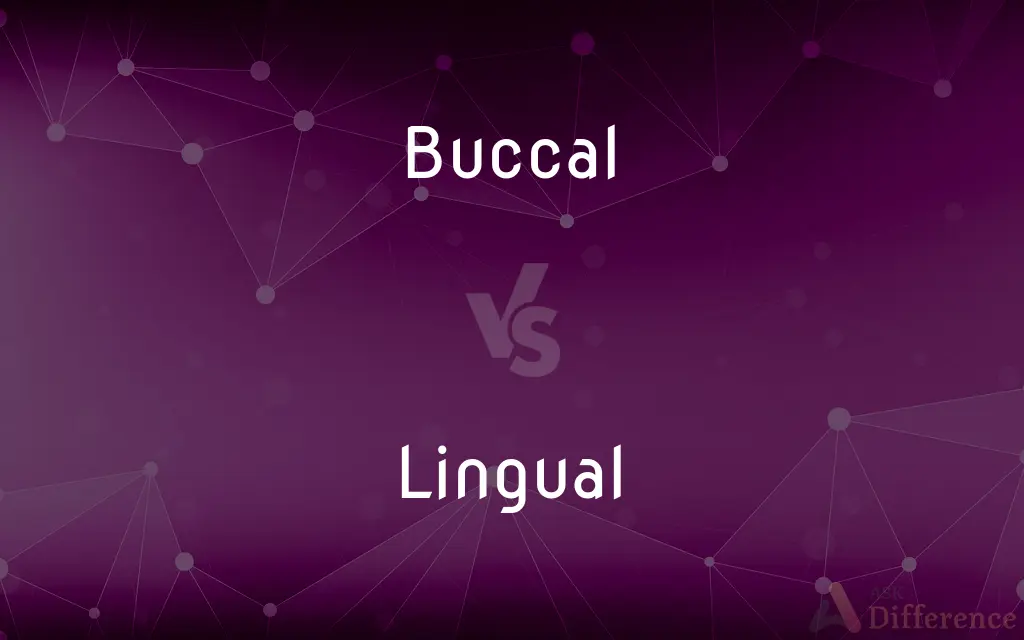Buccal vs. Lingual — What's the Difference?
By Maham Liaqat & Urooj Arif — Updated on March 30, 2024
Buccal pertains to the cheek area inside the mouth, while lingual relates to the tongue, indicating their specific locations within the oral cavity.

Difference Between Buccal and Lingual
Table of Contents
ADVERTISEMENT
Key Differences
Buccal surfaces are those closest to the inner cheek, playing a significant role in the absorption of certain medications due to the mucous membrane's permeability. In contrast, the lingual aspect refers to anything related to the tongue, including its movements, taste functions, and role in speech and swallowing.
In dentistry, buccal surfaces of teeth are those that face the cheeks, specifically in the upper and lower jaws, essential for the diagnosis and treatment of dental conditions. Whereas, lingual surfaces of teeth face the tongue, important for their functional and aesthetic aspects, particularly in the placement of orthodontic appliances.
The buccal cavity or area is crucial for the initial stages of digestion, involving the mastication of food, whereas the lingual abilities, such as taste perception and aiding in food manipulation, are vital for the enjoyment and processing of food.
Buccal administration of medication involves placing the drug between the gum and cheek, offering an alternative route for drug delivery that is often faster than oral ingestion. On the other hand, lingual administration, though similar, places the drug underneath the tongue, utilizing the rich blood supply there for quick absorption.
While both buccal and lingual areas are integral to oral health and function, their distinct anatomical locations and roles contribute differently to dental care, speech, digestion, and medical administration techniques.
ADVERTISEMENT
Comparison Chart
Location in Mouth
Inner cheek
Tongue
Role in Dentistry
Surface of teeth facing cheeks, important for dental health
Surface of teeth facing tongue, critical for orthodontics
Medication Absorption
Used for buccal drug administration
Used for sublingual drug administration
Function
Part of initial digestion, holds medication
Taste, speech, manipulation of food
Importance in Speech
Less direct impact
Vital for articulation and sound production
Compare with Definitions
Buccal
Pertaining to the cheek.
The buccal mucosa is where some medications are placed for quick absorption.
Lingual
Relating to the tongue.
Lingual frenulum ties the tongue to the mouth's floor, affecting speech and eating.
Buccal
Buccal surface of teeth.
Cavities on the buccal surface can be harder to detect without proper dental exams.
Lingual
Involvement in speech.
Lingual agility is crucial for pronouncing different phonemes accurately.
Buccal
Area for medication administration.
Buccal administration is preferred for certain steroids to avoid first-pass metabolism.
Lingual
Key in manipulating food.
The tongue's lingual muscles help in positioning food for effective chewing and swallowing.
Buccal
Involvement in mastication.
The buccal area expands slightly to accommodate chewed food before swallowing.
Lingual
Lingual surface of teeth.
Orthodontic braces are sometimes placed on the lingual surfaces for aesthetic reasons.
Buccal
Part of the oral cavity's structure.
The buccal cavity's condition can significantly affect overall oral health.
Lingual
Area for taste perception.
The lingual papillae contain taste buds that identify sweet, salty, bitter, and sour flavors.
Buccal
Of or relating to the cheeks or the mouth cavity.
Lingual
Of, relating to, or situated near the tongue or a tonguelike organ.
Buccal
Of, relating to, near, involving, or supplying the cheek.
Buccal surface of the molars, buccal branch of the facial nerve
Lingual
(Linguistics) Pronounced with the tongue in conjunction with other organs of speech.
Buccal
Of, relating to, or lying in the mouth.
Buccal cavity
Lingual
Of languages; linguistic
Lingual diversity.
Buccal
(pharmacology) Administered in the mouth, not by swallowing but by absorption through the skin of the cheek; often by placing between the top gum and the inside of the lip.
Lingual
A sound, such as (t), (l), and (n), that is pronounced with the tongue and other organs of speech.
Buccal
Of or pertaining to the mouth or cheeks.
Lingual
Related to, near, or on the side toward the tongue.
Buccal
Of or relating to or toward the cheek
Lingual
(phonetics) Articulated with the tongue.
Buccal
Lying within the mouth;
A buccal gland
Lingual
Related to language or linguistics.
Buccal
Toward the inside of the cheek;
The buccal aspect of the gum
Lingual
(phonetics) A sound articulated with the tongue.
Lingual
Of or pertaining to the tongue; uttered by the aid of the tongue; glossal; as, the lingual nerves; a lingual letter.
Lingual
Lying near the tongue; especially, in dentistry, on the surface of the tooth next to the tongue. Contrasted with buccal, the side of a tooth touching the cheek, i. e. the side opposite to the lingual side.
Lingual
A consonant sound formed by the aid of the tongue; - a term especially applied to certain articulations (as those of t, d, th, and n) and to the letters denoting them.
Lingual
Consisting of or related to language;
Linguistic behavior
A linguistic atlas
Lingual diversity
Lingual
Pertaining to or resembling or lying near the tongue;
Lingual inflammation
The lingual surface of the teeth
Common Curiosities
How is lingual different from buccal?
Lingual specifically pertains to the tongue, involving functions like taste and speech, whereas buccal relates to the cheek area inside the mouth.
Can braces be placed on the lingual surfaces of teeth?
Yes, braces can be placed on the lingual surfaces of teeth for cosmetic reasons, as they are less visible than traditional braces.
How do buccal and lingual areas affect oral hygiene?
Both areas are crucial for oral hygiene, requiring regular cleaning to prevent plaque buildup and dental diseases.
What does buccal mean in medical terms?
In medical terms, buccal refers to anything related to the cheek, including the area inside the mouth against the cheek.
What role does the buccal cavity play in digestion?
The buccal cavity initiates digestion by breaking down food mechanically through chewing and chemically with saliva.
Are buccal surfaces important for dental health?
Yes, the health of buccal surfaces is vital for overall dental health, affecting the diagnosis and treatment of cavities and other conditions.
How are speech disorders related to lingual functions addressed?
Speech disorders related to lingual functions are often treated with speech therapy, focusing on improving tongue movement and coordination.
How does the lingual aspect contribute to speech?
The tongue's movement and flexibility are crucial for articulating sounds and words, making it essential for speech.
How do health professionals assess buccal health?
Health professionals assess buccal health through visual examination, palpation, and sometimes imaging, looking for signs of disease, inflammation, or abnormalities.
Can lingual taste buds lose sensitivity?
Yes, lingual taste buds can lose sensitivity due to various factors like aging, smoking, or certain health conditions.
Do lingual braces affect eating and speaking?
Initially, lingual braces may affect eating and speaking, but most people adapt quickly.
Is buccal fat removal a common procedure?
Buccal fat removal is a cosmetic procedure to reduce the size of the cheeks for a more contoured facial appearance.
Share Your Discovery

Previous Comparison
Demoware vs. Shareware
Next Comparison
Irresponsible vs. NegligentAuthor Spotlight
Written by
Maham LiaqatCo-written by
Urooj ArifUrooj is a skilled content writer at Ask Difference, known for her exceptional ability to simplify complex topics into engaging and informative content. With a passion for research and a flair for clear, concise writing, she consistently delivers articles that resonate with our diverse audience.















































